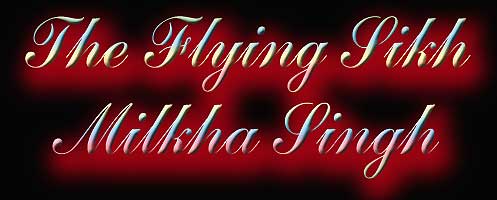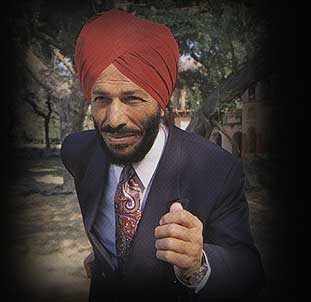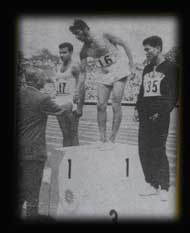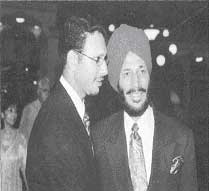

Born: Lyallpur(nowFaisalabad in Pakistan): October 17, 1935. Olympics: 1956 (Melbourne) 1960 (Rome) 1964 (Tokyo)
The
story of Milkha Singh-perhaps the greatest sportsman India has ever produced-is
one of the most inspirational and awe-inspiring in the history of sport. "I
have really cried on only two occasions in my life. Once when I left Lyallpur
(his birthplace, now in Pakistan and known as Faisalabad) during Partition after
my parents were killed and then on that fateful day in Rome." Just 13 years
separate Milkha's flight to freedom in 1947 and his flight to the finish line
at the 1960 Rome Olympics. But what turbulent and cruel years those were. Milkha
came to be known as The Flying Sikh' in an age where the sight of a Sikh in the
West was rare indeed and where his flamboyant presence ensured him a large fan
following.
But in 1947 the Flying Sikh had just one mission on his mind-to
escape to independent India with his life. His parents and other relatives had
been massacred in front of his eyes in the bloody birth of two nations and Milkha
was literally running for his life. Leaving behind everything that he owned back
in Lyallpur, Milkha crossed the border at great peril, hanging onto the under-carriage
of a Delhi-bound train that was bursting at the seams with refugees fleeing to
India.
Milkha was on his own, just 12-years-old and with no one and nowhere
to turn to. But athletics was to be his salvation and today if he is considered
the living legend of Indian sport it is due to the grit and determination he showed
in those early years.
Even as he roamed the streets of Delhi with litl but
the clothes on his back, it was the Army that he turned to for his livelihood
and salvation. The Services not only provided him a life line, offering him work
in the Army mess, also had the facilities to help fulfill a dream the young man
had. The dream to create world record. Milkha would repay his employees manifold
as he blazed a trail glory over Europe and Asia. He was to dominate Asian athletics
to such an extent that he enjoyed a cult following in Tokyo, Manila and many other
Asian capitals during his golden years on the track.
Two Asian Games, three
Olympics and two Commonwealth Games...these events were graced by his dashing
presence. In the 1958 Asiad at Tokyo, Milkha not only won his pet event, the 400
metres, he also beat the favourite in the 200 metres, the Pakistani Abdul Khan
and was the toast of Asian sporting circle The same year at the Commonwealth Games
(then known as the Empire Games), he won his favourite event in 46.6 seconds,
beating the South African Malcolm Spence-a name that was to haunt him two years
later. Milkha had made his Olympic debut at Melbourne in 1956. He recalls the
Games "I was totally lost, like an uneducated child. The clear superiority
of the others in the fray not only shocked me, but inspired me. I whipped the
guts to ask Charles Jenkins (the American winner of the 400 metres) for some tips.
He was so pleasant, he even went to the extent of writing out a training schedule
for me."
This turned out to be the turning point in Milkha's athletic
career. He followed Jenkins' schedule so rigorously that it is said he would often
end up vomiting blood at the end of
a training session, so hard did he push
himself. But there would be rewards to follow. He was peaking perfectly for the
Rome Olympics as his name spread far and wide, making him one of the most famous
Indians of his time. The year before Rome he was awarded America's Helms Trophy
in recognition of being the best quarter-miler of the year. In the authoritative
tome, 'Athletics, a History of Modern Track and Field Athletics' by Italian sports
historian Roberto L. Quercetani, Milkha earns himself a special mention: "Even
more surprising was the rise to fame of the compact Milkha Singh of India (born
at Lyallpur on October 17, 1935; 1.73 m/66 kg), who acted as an ice-breaker in
a country of untapped athletic potential. In 1958 he had won the Empire Games
440 yards title at Cardiff in 46.6 beating Spence among others. In 1960 he came
to Europe early, having by then times of 20.07 and 46.1 to his credit. Just before
the Games he improved to 45.9-an outstanding achievement at a time when hardly
another man in the whole Asian continent could beat 48 seconds."
Milkha
went into the Rome Olympics as one of the favourites for a medal after an outstanding
season on the tracks of Europe. The greatest array of 400m. runners ever assembled
was given the benefit of semi-finals and the final on separate days. The fireworks
began in the quarter-finals themselves when Otis Davis, who had lowered his personal
best to 45.6 just before Rome, equaled the Olympic record of 45.9. He went onto
win the first semis in 45.5, followed by Milkha (45.9) and Manfred Kinder of Germany
(46.0) while Robbie Brightwall lowered the British record to 46.2 but was eliminated,
such was the strength of the field. In the other semis, Carl Kaufmann came through
easily with 45.7 while Spence (45.8) and Earl Young (46.1) were the other qualifiers
for the final to be staged on September 6.

Milkha
singh , second from left comes fourth in the 400 metres at the Rome Olympic Games
A
total of 54competitors from 41 nations had striven against each other for the
honour to reach the final and among them was India's pride and joy. Milkha drew
the fifth lane. He had beaten all the top quarter-milers in the world in the run
up to Rome, except the American Davis. Quercetaini had predicted at least a silver
for Milkha who would later admit that even he had gold on his mind, such was his
form at the time. Milkha still remembers the race as if it were yesterday. "Going
into the stadium for the final, I was quite relaxed but when I saw my rivals,
the tension mounted. And with each minute it increased. I drew lane five with
South African Malcolm Spence to my left and the German Manfred Kinder on my right.
I was going strong till about 250 metres. But then I slowed down a bit. I thought
the pace was very fast and I would fizzle out in the end if I continued at that
speed. At that point I even looked back or maybe it was just a side-glance. But
that fraction of a second decided my fate. One by one they all caught up with
me-Spence, Kaufmann and Davis and it was all over. My mistake will rankle within
my heart till my dying days. I could not wipe out the deficit of those six or
seven yards in the last 100 metres, though I was running at my best.
"
I desperately tried to catch up with at least the boy in the third place (Spence)
whom I had beaten in the Commonwealth Games. But he was caught up with the first
two runners and it helped him. We crossed the finish line almost together. I knew
I had made a crucial mistake but was hoping against hope as i waited for the official
photo finish. But as my bad luck would have it, I was declared fourth even though
my time (45.6) was better than the existing Olympic record of 45.9. Davis and
Kaufman were both clocked at a world record time of 44.9 and Spence was third
in 45.5. "This race was considered one of the greatest of all time with the
first two breaking the existing world record and the third and fourth the Olympic
record. Even the fifth and sixth place (Kinder and Young) who both clocked 45.9
broke the pre-Rome Olympic mark. It was that kind of race. But that was scant
consolation for the heart-broken Milkha.
Unofficial automatic timings were
also available at Rome and the timing for the winner was put at 45.07 seconds
while Spence was third in 45.60 and Milkha was recorded at 45.73. "My dreams
were shattered. I waited for the medal ceremony and congratulated Davis, Kaufmann
and Spence. But to tell you honestly, I hated doing it. If I had my way I would
have snatched the medals off their hands and run away.
"Before the race
I generally stayed in my room concentrating. But after it, I had no interest in
anything. I did not see much of Rome. I was at the end of my tether. Decline had
set in, I felt after years of dominating the sport. I passed a few days immersed
in sorrow. To return to India in that state of mind would have been dangerous."
So instead Milkha did what he did best. He participated in competitions in England,
Denmark, Sweden and Norway.
"As I boarded the plane at London to return
to Bombay, I was gnawed by fear. How would I face my countrymen? I drowned my
disappointment in liquor, reaching Bombay in a state of semi-drunkenness. I was
ashamed of myself and did not want to face anyone. But then somehow I controlled
myself. Many pressmen were present at Bombay. Friends tried to console me, pointing
to the Olympic record. But my mistake still rankled. The athlete I had trounced
earlier walked off with the bronze while I had to return empty handed". Apart
from his 200-400 metres double in the 1958 Asiad, Milkha also won gold in the
400 metres four years later in Jakarta.
Milkha's time in the 400 metres stood
as the best by an Indian till it was finally broken by Paramjeet Singh of the
Railways at the Calcutta Open Nationals on November 4, 1998. Milkha had offered
a reward of Rs 100,000 and later doubled it for anyone breaking his marks, including
his time of 20.7 seconds for the 200 metres set at Lahore in 1960. Paramjeet's
record of 45.70 was electronically timed while Milkha's time of 45.6 was hand-timed.
Milkha claims the record still stands in his name. His stand stirred up a controversy
two years ago.
Milkha's credited electronic time of 45.73 seconds at Rome is
not a 'converted' timing, but an electronic one. Conversion would have meant a
time of 45.74 seconds since the convention is to add 0.14 seconds (0.24 in 100
and 200 metres) to the hand timing to reach an electronic equivalent. Milkha's
'official' time at Rome was 45.6 seconds. Until 1964 official timing was manual
in the Olympics, though from 1932 electronic timings were also incorporated wherever
available within parenthesis alongside the 'official' hand timings in the Olympics
results.
Thus Milkha's time at Rome is given as 45.6 (45.73) while Davis was
clocked at 44.9 (44.07), Kaufmann also at 44.9 (45.08) and Spence at 45.5 (45.60).
Track and field statisticians give precedence to electronic timings and the Indian
National mark in the 400 metres in the name of Milkha had been listed as 45.73
and not 45.6 as electronically timed results were available at Rome.

Milkha
singh receiving the gold medal for 200 metre sprint at the third asian Games 1958
Then on July 17, 2000 in Bangalore, his 200 metres record also fell, to Anil
Kumar. This fact though went largely unnoticed in the Indian media. What is not
in dispute is Milkha's stature which stands tall till today. He now leads a contented
retired life in Chandigarh after a stint as Director of Sports in the Punjab government.
His son Chiranjeev 'Jeev' Milkha Singh is India's leading pro golfer. The fighting
spirit of the Flying Sikh thus lives on in the next generation
. Milkha
Singh with his son Chiranjeev
Milkha
Singh with his son Chiranjeev
Article taken with thanks from 'Great Indian Olympians'.